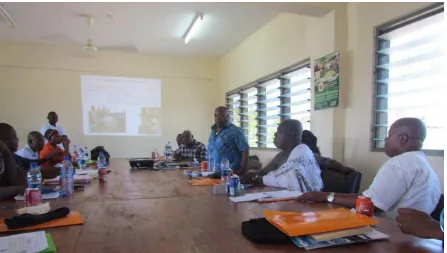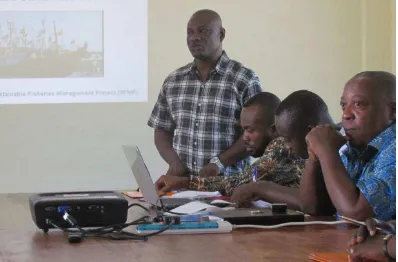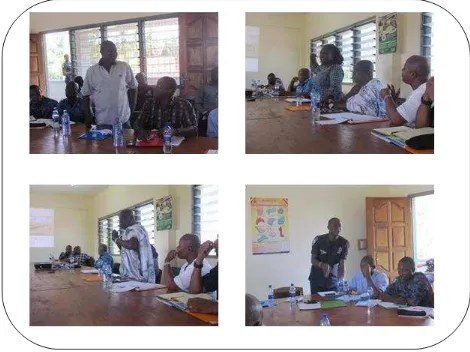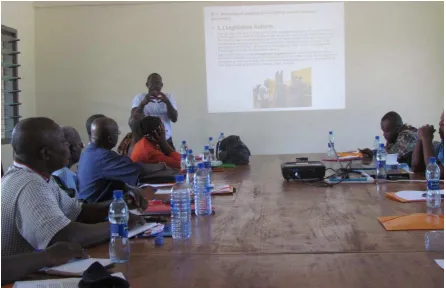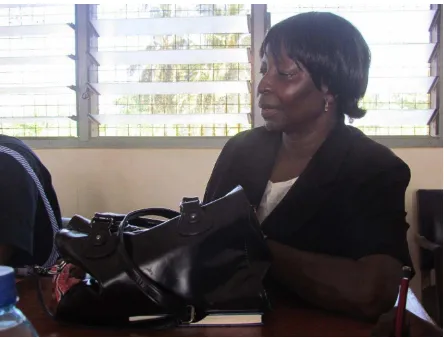SUSTAINABLE FISHERIES
MANAGEMENT PROJECT (SFMP)
Western Regions Fisheries Working
Group
This publication is available electronically on the Coastal Resources Center’s website at
http://crc.uri.edu
For more information on the Ghana Sustainable Fisheries Management Project, contact: USAID/Ghana Sustainable Fisheries Management Project
Coastal Resources Center
Graduate School of Oceanography University of Rhode Island
220 South Ferry Rd.
Narragansett, RI 02882 USA
Tel: 401-874-6224 Fax: 401-874-6920 Email: [email protected]
Citation: Friends of the Nation (2015). Western Regions Fisheries Working Group.
USAID/Ghana Sustainable Fisheries Management Project (SFMP). Narragansett, RI: Coastal Resources Center, Graduate School of Oceanography, University of Rhode Island and
Friends of the Nation. GH2014_POL044_FoN. 24 pp.
Authority/Disclaimer:
Prepared for USAID/Ghana under Cooperative Agreement (AID-641-A-15-00001) awarded on October 22, 2014 to the University of Rhode Island and entitled; the USAID/Ghana Sustainable Fisheries Management Project (SFMP).
Detailed Partner Contact Information:
USAID/Ghana Sustainable Fisheries Management Project (SFMP) 10 Obodai St., Mempeasem, East Legon, Accra, Ghana
Brian Crawford Chief of Party [email protected]
Najih Lazar Senior Fisheries Advisor [email protected]
Patricia Mensah Communications Officer [email protected] Bakari Nyari Monitoring and Evaluation Specialist [email protected]
Don Robadue, Jr. Program Manager, CRC [email protected]
Justice Odoi USAID Administrative Officer Representative [email protected]
Kofi.Agbogah
SNV Netherlands Development Oganization #161, 10 Maseru Road,
E. Legon, Accra, Ghana 233 30 701 2440
Donkris Mevuta Kyei Yamoah [email protected] Friends of the Nation Parks and Gardens Adiembra-Sekondi, Ghana 233 312 046 180
Peter Owusu Donkor Spatial Solutions
[email protected] #3 Third Nautical Close,
Nungua, Accra, Ghana
Darkuman Junction, Kaneshie Odokor Highway
Headmaster residence, Sekondi College Sekondi, Western Region, Ghana 233 243 326 178
For additional information on partner activities:
CRC/URI: http://www.crc.uri.edu CEWEFIA: http://cewefia.weebly.com/
DAA: http://womenthrive.org/development-action-association-daa Daasgift:
https://www.facebook.com/pages/Daasgift-Quality-Foundation-FNGO/135372649846101 Friends of the Nation: http://www.fonghana.org Hen Mpoano: http://www.henmpoano.org
SNV: http://www.snvworld.org/en/countries/ghana SSG Advisors: http://ssg-advisors.com/
ACRONYMS
CEDECOM Central Region Development Commission
CEWEFIA Central and Western Region Fishmongers Improvement Association CLaT Child Labour and Trafficking
DAA Development Action Association DSW Department of Social Welfare FoN Friends of Nation
SFMP Sustainable Fisheries Management Program SNV Netherlands Development Organization
USAID United States Agency for International Development WFCL Worst Forms of Child Labour
TABLE OF CONTENTS
Acronyms ... ii
INTRODUCTION ...1
METHODOLOGY ...1
DETAILED SESSION...1
Purpose of meeting by Donkris Mevuta ...1
Introduction to SFMP by Mr. Kofi Agbogah ...2
State of Ghana's Fisheries by Mr. Alex Sabah ...3
Comments from participants ...3
Strengthening enabling conditions for marine governance by Kwadwo Kyei Yamoah ..5
Proposed Membership and Proposals ...7
CONCLUSION ...7
CLOSURE ...7
Appendix ...8
LIST OF FIGURES
Figure 1 Mr. Donkris Mevuta explaining purpose of the meeting to participants ...2Figure 2 Mr. Kofi Agbogah introducing the SFMP to participants ...3
Figure 3 Stakeholders delivering their comments. ...4
Figure 4 Mr. Yamoah presenting on enabling conditions for marine governance ...5
INTRODUCTION
On Tuesday May 12, 2015, the members of the Western Regional Fisheries Working Group met at the Conference Room of the Fisheries Commission, Takoradi. This meeting sought to ensure a continued support for the Western Region Fisheries Working Group (W/R FWG). The W/R FWG was formed during the previous USAID supported ‘Integrated Coastal
Fisheries Governance (ICFG) Initiative’ to serve an advisory role to the region's Fisheries Directorate.
Having chalked some successes with its mandate during the ICFG era, the Sustainable
Fisheries Management Project (SFMP) deemed it fit to continue supporting the group.
METHODOLOGY
The meeting used a mixture of methods including power-point presentations, experience sharing, interactive discussions, as well as question and answer segments. Both English and the local dialect (Fante) were used throughout the meeting to ensure active participation of all participants.
DETAILED SESSION
The three-hour meeting started at 10:00 am and ended at 1:00 pm. The meeting started with an opening prayer by Mr. J.K. Ansah. A round of introductions flowed so that new members could familiarize with current members of the FWG. Afterwards, participants were informed of purpose for the meeting.
Purpose of meeting by Donkris Mevuta
Mr. Mevuta, began his remarks by appreciating participants for making time to attend the meeting. He gave a brief overview to the formation of the FWG. He informed that the group was inaugurated in January 2011 by Hon. Mike Acheampong, the then Chairman of the Fisheries Commission (FC). The FWG was mandated to provide an advisory role to the Regional Directorate of the Fisheries Commission by advising the Director on pertinent issues.
He recalled how members of the FWG, led by the Chairman, Mr. Danny Kirk-Mensah, participated in several dialogue meetings, where they made relevant contributions. Mr.
Mevuta again noted that there was however challenges about the sustainability of the group in case of exit of the ICFG initiative. To mitigate this challenge, he recalled how the Fisheries Commission, Friends of the Nation (FoN) and Hen Mpoano (HM) assisted the group to have three more successive meetings even after the exit of the ICFG initiative. By this, he added that, the FWG concept has been sustained over the years, and currently poised to continue the dialogue on the new SFMP.
Figure 1 Mr. Donkris Mevuta explaining purpose of the meeting to participants
Introduction to SFMP by Mr. Kofi Agbogah
Mr. Abgogah, having introduced his organisation and explained how it became part of the SFMP, noted that there are nine implementing partners on board the SFMP with the Coastal Resources Centre of the University of Rhode Island (CRC-URI) being the key implementing partner. He noted that the project is being funded by the American people through the United States Agency for International Development (USAID). He explained the main objective of the SFMP as 'to rebuild Ghana's marine fisheries stocks and catches through the adoption of responsible fishing practices. He hinted that the past ICFG initiative was a learning process which success led to the inception of the SFMP. The main purpose of the SFMP is to reverse the trend of decline in Ghana's fisheries, he added.
Figure 2 Mr. Kofi Agbogah introducing the SFMP to participants
State of Ghana's Fisheries by Mr. Alex Sabah
Mr. Alex Sabah, the Western Regional director of the Fisheries Commission indicated that Ghana's fisheries is in a critical condition, therefore needs collaborative approach in
managing the resource and reversing the dwindling trend. He noted that the FWG has been very helpful to the Fisheries Commission since the last 4 years. He added that the members have been very active and have drawn attention of the FC to a lot of illegalities, and have
advised the Commission on several occasions which yielded better results. This, he indicated, is a very good collaboration between resource users and state regulators. He however pointed out that there is the challenge of finding some of the members of the group being involved in illegalities and therefore may have to be advised to desist from the acts or be expelled from the group.
Comments from participants
Nii Botchway (Ghana Inshore Fishers Association)
We as fishermen need some scientific information which will inform us as to when and when not to fish the Sardinella species. We are always of the view that if we decide not to fish them, the fish will end up being fished somewhere anyway.
Nana Kwesi Bin (Traditional Authority - Axim)
I think this SFMP is a very good project and I believe through a gradual process, as has been noted by the resource persons, we can help bring back the Sardinella, so I crave the
Figure 3 Stakeholders delivering their comments.
Top left: Thomas Suapim. Top right: Mrs. Emelia Abaka-Edu. Bottom left: Nana Kwesi Bin. Bottom right: L/Cpl. Agyemang Opambour.
Thomas Suapim (Chairman - W/R Fish Processors & Traders Association - Shama) Most of
the fish processors suffer a lot of aftermath effects on their hands anytime they smoke fish caught with dynamite. In addition, although fish caught with chemicals may look
very fresh when smoked anew, they tend to lose their beauty and good taste after a few hours. We learnt the Fisheries Commission has Fish Testing Devices, yet they do not utilise this at our beaches. I want to use this opportunity to encourage the project to consider some of these interventions.
Emelia Abaka-Edu (National Vice President - Ghana Fish Processors & Traders
Association)
I was privileged to partake in the study tour organised by the ICFG Initiative to Tanzania. Over there, it was all the fishermen who agreed to stop dynamite fishing; and they received a lot of training such that even a child could identify fish caught by dynamite and report to the appropriate authorities without nepotism. This is possible here in Ghana; and this project may consider building capacity of the local populace to identify fish caught with chemicals.
From previous interactions on the ICFG project, I learnt that fishermen use various strategies to make fish caught with chemicals look fresh. For instance, some fishermen dissolve "cow dung" and use it to wash the fish, freeze it with ice before they land. With this strategy, the fish does not break easily as it would have, when fished with chemicals. The chemical testing device is therefore a good initiative to be implemented.
Strengthening enabling conditions for marine governance by Kwadwo Kyei Yamoah
Mr. Yamoah informed that as part of the SFMP activities, FoN will be engaging a lot of grassroots stakeholders to ensure they are part of every process relevant to the project. He specified some activities to include, but not limited to:
Legislative reforms for co-management
Stakeholder caucuses and hearings at some selected major landing sites (Tema, Elmina, Axim and Sekondi)
Strengthening law enforcement
He talked briefly about the milestones and expected output of all the activities. He added that the FWG should be in a good position to make inputs into the outcomes of the participatory consultations and regional discussions. The group was advised that there should be some representatives, who would present consensus reached by the group on pertinent issues at national fisheries dialogue platforms that will be organized in the course of the year. Again, he informed participants about the projects interest in reducing
Child Labour and Trafficking (CLaT) in fisheries.
After this presentation, he allowed questions and comments from participants, and then solicited proposals to inform the new membership of the FWG.
Questions (Q), Comments (C), & Responses (R):
C: Alex Sabbah: For the CLaT, I think it would be prudent to work with the GES to enforce
FCUBE.
Q: Emelia Abaka-Edu (Mrs.): I want clarity on child labour and how it is defined.
R: We have initiated studies into the issue, and the outcome will inform us better.
C: Nii Botchway: Currently, I think the fines for infringements are too harsh, so let's try to
make the law to suit the very people the law is made for
C: Nana Kwadwo Bin: As part of engaging fishermen to the right thing, we should be
mindful of some nitty-gritty of the industry. For instance, fishermen use generators to help create reflectors for on-coming vessels. All the generators are not used for fishing, so if people are arrested for the wrong reasons, then we are not doing justice to the laws.
C: Kirk Mensah: I believe reflectors could be imported by the Commission to eradicate the
ambiguity of light fishing as Nana Kwadwo Bin has stated.
R: Participants should not rely on the government for everything. The ambiguity in light fishing can be solved if some fishermen will take up the task of importing the reflectors and make a private business out of it as part of co-management practices.
Q: Stella Cobbah (Ghana Maritime Authority - GMA): I want to know whether the concept
of co-management is now being introduced or it exists already.
R: Co-management exists already in several forms but has no legal backing.
C: Ms. Pat Klinogo: I believe it's very good to include the GMA in the FWG. I also think that
we can take opportunity of the legislative reform process to get appropriate legal backing for the FWG. I believe the amendment of the Fisheries Laws did not consult the fishermen, in that the new fines are way beyond reality. I suggest that the members of FWG should educate their fishers to avoid illegal fishing because the amount is just too much ($ 1 million). Having suggested these, Ms. Klinogo hinted on a challenge from her office, indicating that the
Figure 5 Ms. Pat Klinogo making her submissions
Proposed Membership and Proposals
On membership, the group noted that the inclusion of the GMA will go a long way to support the work of the FWG. They added that the membership is okay as it stands now.
CONCLUSION
Before the meeting ended, Mr. Nii Botchway made a submission for the Fisheries
Commission to modernise the inshore fisheries register since most of their vessels are not as big as some artisanal canoes. The participants were also informed of illegal construction of new vessels at Ngyeresia beach which needs to be discouraged. The FWG also showed strong interest in collaborating to deal with CLaT.
